Recently, my mother told me that the woman she called mom—in reality, she was mom's aunt Martha—worked for many years with people in the garment district of her little town of Bärwalde. The people she worked with were Jewish, and they were friends.
 When mom was christened in about 1935, one of these friends was in attendance and gave her a gift: a handmade macramé lace bag (I’m only guessing it’s macramé and lace; what do I know?). Its flap sported a star of David. In its center were my mother’s initials: ES (Edith Schultz).
When mom was christened in about 1935, one of these friends was in attendance and gave her a gift: a handmade macramé lace bag (I’m only guessing it’s macramé and lace; what do I know?). Its flap sported a star of David. In its center were my mother’s initials: ES (Edith Schultz).I asked mom what became of this friend and the other Jewish friends. She was sure they made it out of the country to safety, probably to Switzerland. I pressed for details. She said that they had stayed very long—until maybe 1941. But they did get out. (This late date strikes me as implausible; mom was a young girl when these events occurred, and maybe she has her dates wrong.)
Aunt Martha must have greatly valued the little bag, for she took it with her when, late in the war, they fled west to evade the Russian advance. She was able to take very few things, and what she did take she struggled to preserve (they fled on an open train car, which was strafed by Russian planes).
Evidently, my mom took it with her when she headed for North America six years later, alone, at age seventeen. (She lied about her age.) Martha died ten years later. By then, mom had finally made it to the U.S.A.
Today, on my way to work, I ran into my dad who said that mom had found the bag. I said I’d drop by to take some pictures. And so I did.
What follows is an account of Martha and my mom's exodus from Bärwalde in 1945 that I wrote several years ago. It was based on taped interviews from 2004 of my mother, Edith, and my dad, Manny:
By early 1945, the collapse of Germany had begun, and, in the eastern part of the country, the Russians advanced.
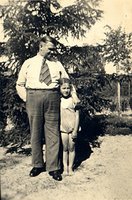 Edith, who was 11 or 12 years old, lived with her mother in Bärwalde, Pommern, in the eastern part of Germany. The woman Edith calls her mother was in reality her aunt, who, along with her husband, took Edith in when her real mother died in the late [?] 30s. [Her death is somewhat mysterious.] In 1941, her uncle died as well. Edith was very close to him. (Her actual father died in 1939.)
Edith, who was 11 or 12 years old, lived with her mother in Bärwalde, Pommern, in the eastern part of Germany. The woman Edith calls her mother was in reality her aunt, who, along with her husband, took Edith in when her real mother died in the late [?] 30s. [Her death is somewhat mysterious.] In 1941, her uncle died as well. Edith was very close to him. (Her actual father died in 1939.)
In those days, in Germany, no child was legally permitted to be without two parents, and so, when Edith’s uncle died, the town’s chief of police—a family friend—was assigned the role of father-guardian.
At the time of her real mother’s death, Edith’s sister, Ilsa, was sent to live with other relatives nearby.
Edith recalls that Ilsa was somewhat “gung ho,” a patriot. So was Edith, in a way, she now says, for she was an avid athlete, an ardent competitor, and, as we know, the Nazis promoted athletics. Edith remembers attending the 1936 Olympics in Berlin. She loved that sort of thing.
In the days before the Russian invasion, Ilsa moved in with Edith and her mother. They lived in a beautiful home on a hilltop—the last house on the eastern side of town, and thus the dwelling that would first encounter the advancing Russians. Already, local soldiers occupied it: ammunition and weaponry was stored in the garden, and men were billeted inside. Now, as the Russians drew close, the local soldiers selected this particular home for their defensive stand.
“It would be like a fort,” says Edith.
Edith’s mother stubbornly refused to abandon her home, protesting, repeatedly, that she had worked too long and hard on it simply to abandon it. The soldiers tried to tell her what the Russian troops would do to women, even to little girls, but she wouldn’t listen. Finally, the soldiers commanded: “Take the two girls and leave here, now!” And so, on the 28th of February 1945—Edith recites the date without hesitation—Edith, her “mother,” and her sister, along with several relatives, abandoned their fine home.
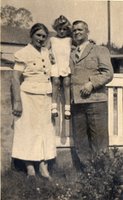 Most of Edith’s relatives lived on farms and thus owned wagons, but Edith and her mother lived in town, and they lacked transportation. The soldiers told them to go the railroad station to await the westbound military trains, so Mom and the girls and a few other relatives packed their most cherished belongings in suitcases and put them on a little wagon—Edith remembers that it was like the little red wagons kids have here in the U.S.—and rolled their stuff to the station.
Most of Edith’s relatives lived on farms and thus owned wagons, but Edith and her mother lived in town, and they lacked transportation. The soldiers told them to go the railroad station to await the westbound military trains, so Mom and the girls and a few other relatives packed their most cherished belongings in suitcases and put them on a little wagon—Edith remembers that it was like the little red wagons kids have here in the U.S.—and rolled their stuff to the station.
They waited there for days, enduring strafing and bombing. Edith remembers the siren’s howl and the noise of bombs and guns. At one point, the station [?] suffered an attack that killed fifteen hundred people, including most of their neighbors and relatives, who were also waiting for the trains. (Apparently, German papers ardently covered such events.)
Finally, the trains arrived, and so the refugees hurriedly secured possessions, and themselves, to the open flatcars. Then, at the end, there came another attack. Some people hid by the flatcars, while others dove under nearby wagons. Edith ran clear of the trains and into a hole somewhere. All of a sudden, a portion of one train blew up, killing everyone aboard it.
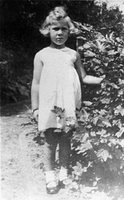 Edith remembers that, about then, the engineer of her train yelled, “the Russians are closing in on all sides; everybody get on the train; we’re leaving now!”
Edith remembers that, about then, the engineer of her train yelled, “the Russians are closing in on all sides; everybody get on the train; we’re leaving now!”
The engineer was a Pole. Polish prisoners had worked and lived in the town since the invasion of Poland years earlier. People from conquered territories manned much German industry during the war, and, evidently, they did other work as well. Edith recalls that Polish women and girls worked as domestics in her town.
Edith’s mother ran the family lumberyard across the street from their home, and that business relied on thirty or so Polish workers who slept on bunk beds in a barn-like structure. Edith says that her mother prided herself in treating her prisoners with kindness, and, in general, prisoners were not mistreated in the town, though she recalls that there were exceptions.
Manny explains that, on the eastern front, many “German” soldiers were in fact Poles, Ukrainians, and Finns who had decided to join the Wehrmacht [army]. They wore the regular German army uniform, but with a thin armband indicating their non-German nation of origin. (Manny lived in southern Germany.)
Evidently, during the Russian advance into collapsing Germany, some Poles stayed, hoping to be embraced by their new masters; others feared the Russians no less than did the natives and, alongside Germans like Edith and her little group, they fled to the west. Many Poles thus eventually ended up in barracks-like housing—at first, along with German refugees—in what became West Germany, and lived in those conditions well into the 50s.
Edith says that the non-German refugees were often mistreated, though she adds that the German refugees, too, were not treated well, since, wherever they showed up, they represented an added burden on already burdened locals.
Some of Edith’s relatives, including Oma Losa, didn’t make it out of Pommern. Later, Edith learned that the younger girls who remained behind—not Oma Losa, who was older, but virtually all of the younger women, including toddlers—were raped. That was the fate of Edith’s sister-in-law, Frida. Years later, says Edith, Frida refused to acknowledge the event, though what had happened to her was no secret at the time. There was no doubt that it had occurred and that it was traumatic. (See Red Army atrocities. See also Every German female raped.)
The invading soldiers had diseases, and so, says Edith, it was necessary for rape victims to do all sorts of awful things to themselves. Terrible bubbling liquids were used, she says.
Polikarpov I-16 "Rata" (rat)
Frida was raped, but her husband was killed. He had worked for the diplomatic service, and, when the Russians entered and ransacked his and Frida’s home, they found pictures of him in uniform with his ribbons and medals. They assumed that he was a dignitary, an official. He had built a hiding place behind a false wall, and he and Frida were there when the Russians entered the house; but these Russians were no fools: they tapped on the walls and found the two. They dragged Frida’s husband to the front of the house and hanged him there.
Edith’s little group of refugees learned these terrible facts only later; they learned about the rapes and killings and about the burning of all the homes of the neighborhood; they learned, too, that all the younger people were forced by the Russians into work camps.
For some reason, says Edith, after about two years, the Russians allowed Germans to leave, and so they did, traveling west. That was before the Wall had been erected to prevent emigration.
During that exodus and before, people were scattered throughout the country and had no way to find each other. Agencies such as the Red Cross organized efforts to reunite family and friends. Thus, they would announce that former citizens of town X were to meet in town Y at a certain date. People arrived there, carrying signs with their names on them. This went on for years.
Edith remembers one day—this was years later, when she lived near Hamburg—coming home from work and noticing the smells of cooking wafting from her family’s small apartment. She was alarmed, for she knew that, at that moment, her mother and sister were elsewhere. When she entered, she was astonished to find that the mystery cook was none other than her Oma Losa!
Manny hastens to add that, before Edith and her group left Pommern by rail, they had the option of travelling north, instead, to a Baltic harbor, where a ship awaited refugees. But travel by ship would mean abandoning various larger things that they hoped to take with them. Edith’s mother therefore insisted that they take the train.
That was fortunate: later, they learned that the Russians sank that ship, killing most on board. (After this taping session, my father read an issue of National Geographic that described the sinking of the Steuben. See National Geographic: Ghost Ship Found.)
I have done further research, and it appears that three refugee ships (part of a massive evacuation project) were sunk by a Russian sub at about that time, killing perhaps 20,000 people. It is possible that the ship that my mother almost boarded was one of the other two. See also Sinking of the Wilhelm Gustloff. See also Tragedy at Sea.]


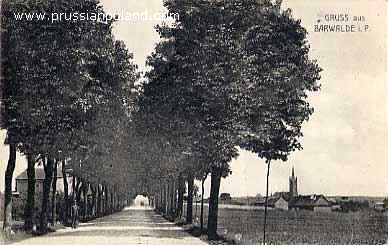
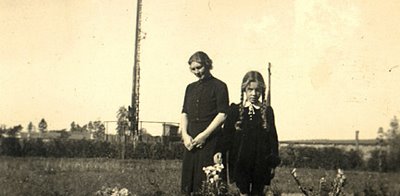
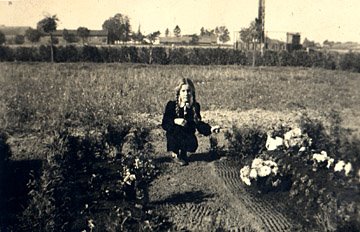






4 comments:
It's a miracle your mother isn't nuts.
That bag is beautiful. What a lovely heirloom. The fabric looks like linen and the edging is some type of handmade lace, either needle or bobbin. I can't tell from the photo specifically which type though.
Amazing. ES
Great stuff,and well written.
Post a Comment